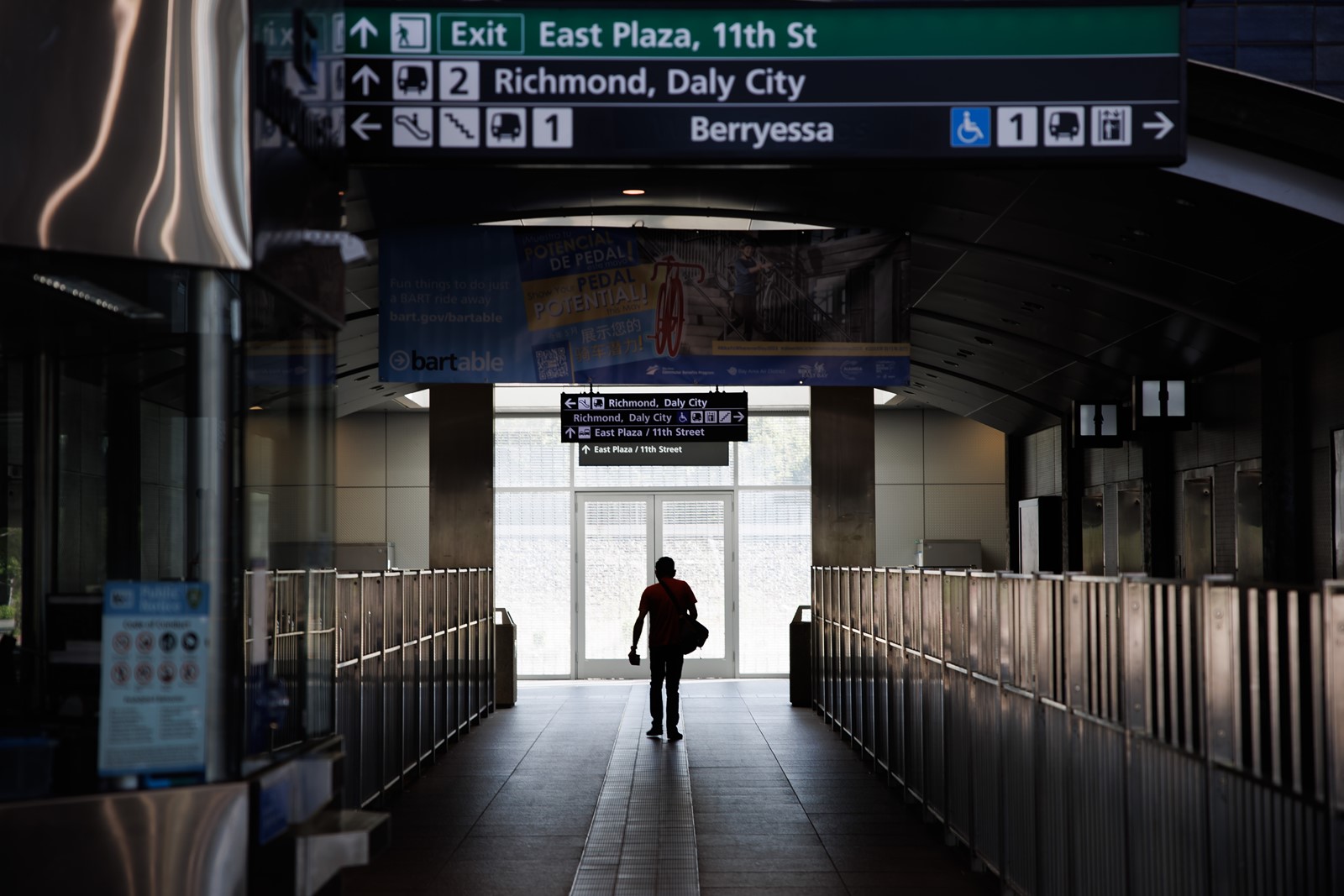
A systemwide closure on BART early Friday that affected thousands of commuters was caused by a network connectivity issue that prevented controllers from seeing train locations, preventing safe operation of the system, according to a BART official.
Riders found their usual way to work was unavailable, and freeways were clogged following the shutdown. The 50 stations in BART’s ridership area were all closed for nearly five hours.
The agency announced the closure of the system about 4:25 a.m. The system-wide closure ended about 9:20 a.m., and major delays followed into the afternoon.
BART has long relied on aging technology to keep the system running, but officials said Friday that the problem was not related to any older system.
“BART has upgraded our computer systems recently, and we don’t believe this issue was caused by old legacy equipment,” BART spokesperson Alicia Trost wrote in an email. “This issue is also not about the need to replace the train control system. This issue is about network devices, which are not aged, not having proper connectivity.”
More than 170,000 passengers use BART on a typical weekday.
“This outage showed once again how essential BART — and transit generally — is to life in the Bay Area,” California State Sens. Scott Wiener, of San Francisco, and Jesse Arreguin, of Berkeley, said in a joint statement. “Everyone suffers when we lose robust public transportation service: Our roads rapidly become choked with traffic, workers are unable to make it to work, children miss their rides to school, and businesses lose customers.”
Weiner and Arreguin are co-leading an effort to secure $2 billion into the state budget for transit statewide.
In a statement, BART general manager Robert Powers apologized to riders.
“We apologize for the disruptive morning and not having train service to get people where they need to go,” Powers said. “Reliability is our brand, and we understand the impact when the system isn’t working. This came down to the fact our control room did not have visibility of our system, and we will not run service if we can’t guarantee safety. We will learn from this incident and are committed to continuous improvement. We are grateful to our partner transit agencies who were able to help our riders.”According to a statement from BART, “the root cause of the disruption was related to network devices having intermittent connectivity. Staff in the operations control center lacked the visibility of the track circuits, and the train positions necessary for safe operations. Visibility of this system in the operations control center is required to run service.”
The agency said a network engineering team “identified and isolated a redundant sector of the network that was causing intermittent visibility and disconnected it. This allowed service to begin.”
It made for a less-than-happy Friday for some riders.
Rick Branum, a federal government employee who commutes daily from Brentwood to San Francisco, arrived at the Antioch station about 4:45 a.m. only to be turned away.
“There was a BART police officer and someone at the counter telling us to go home,” Branum said. “They didn’t say what happened, or when service would resume.”
Malik Anderson, a 23-year-old resident of Oakland, was on his way home from work in San Jose on Friday morning and said that he wished BART communicated the shutdown and delay more proactively. He noted that he did not find out about the shutdown until arriving at the station.
“I’m just coming off work,” he said. “I’m trying to just go to sleep, so I just have the problem (of sleeping) on BART, and that wouldn’t be comfortable.”
Ttori Johnson, 42, of Oakland, said she has been taking BART to work several weeks after her car was totaled in a crash. She called the closure “a minor inconvenience,” given how she had the ability to hail a ride and still get to work. Without those, “it would be otherwise devastating to me,” she said.
Jake Darin, 34, also took a sympathetic view to the situation. He was waiting for an Uber ride on Friday morning to his job in San Francisco.
“I’m grateful to have BART, so when it doesn’t work out, it’s frustrating,” Darin said. “But one day out of the year is alright.”
Even after train service resumed, only a trickle of riders entered the Berryessa station as the benches outside the station sat empty.
Joe Garcia, 27, of El Cerrito, said the closure made for a hectic morning. He normally takes BART from the El Cerrito station to the Rockridge station in Oakland, where he works as a barista. But he had to exit at the MacArthur station about 9:30 a.m. Friday, because the yellow line was not running east. That meant he had to walk the rest of the way to his job.
“It’s a minor inconvenience, but what are you going to do?” Garcia said.
AC Transit and Muni offered aid to riders and honored BART tickets during the incident. Traffic at the MacArthur Maze and at the westbound entrance to the Bay Bridge was uncommonly heavy for a Friday commute.
Majay Kell, of Oakland, who commutes to San Francisco to his job as a physical education teacher, stood on Broadway near the entrance to the 19th Street station about 6:50 a.m., awaiting an Uber to get him there.
“Technology is great when it works,” he said with a smile.
Staff writers Hema Sivanandam, Caelyn Pender and Harry Harris contributed to this story.


 PREVIOUS ARTICLE
PREVIOUS ARTICLE
